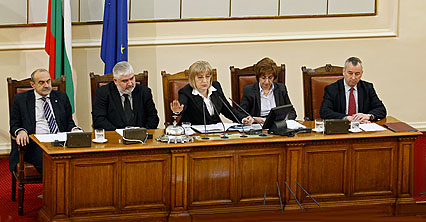
The National Strategy for Development in the Field of Science and Technology adopted by the parliament foresees investments in these fields to reach 1, 5 per cent of the GDP. The strategy was introduced to the National Assembly by the Council of Ministers. The necessary funds will be provided by the state budget and will be laid down in the 3 years budget prognosis of the different administrators of the funds. The aim is to help Bulgarian science become an engine for economic development through innovations. In addition the strategy identifies the priority scientific fields for development as biotechnologies, energy, transport, information technologies, and cultural heritage. The document also elaborates on how to make the science field and carееr more attractive and how to make the connection between education, science and business sustainable and how to assess effectively scientific research. On the grounds of the strategy will be elaborated specific action plans and measures to attain its goals. The development of contemporary competitive research centers is one of the goals set by the strategy. The document also introduces some indicators for assessment of the scientific research results such as the amount of expenditures for scientific research as percentage of the GDP, the percentage of the structural funds used for scientific research and development, the percentage of public funds used in priority scientific fields. The minister of education Sergey Ignatov explained that the strategy was prepared following a macroeconomic and sector analysis and approval of the set priorities by the ministries of economy, education and finances.
With amendments adopted on second reading to the Higher Education Act, the parliament further decided that future accreditation of institutions and programs will be held according to a ten score system starting from 0 to 10. The present evaluation is based on a four level scale: very good, good, satisfactory and unsatisfactory. Deputies did not approve an accreditation of 9. 10 scores to be valid for 8 years as was proposed by the mover of the bill. They opted for the 6 year term proposed by the Movement for Rights and Freedoms MP Lutvi Mestan – the same term valid currently for accreditations “very good” and “good”. The scientific research activity evaluation will be the most important in the accreditation scoring. Deputies did not agree with the proposal that a member of the academic faculty could take part in the accreditation of only one school and left the current text, which allows participation in the accreditation of no more than two schools. The National Assembly decided as well that Bulgarian Higher Educational Institutions will be allowed to open subsidiaries abroad and removed the tuitions ceiling for graduate programs.

- 22/04/2021
The Parliament imposed a moratorium on concessions, real estate deals and appointments pending the election of a new cabinet or caretaker government - 16/04/2021
By 156 votes “in favour”, the National Assembly accepted the resignation of the Council of Ministers with Prime Minister Boyko Borisov - 15/04/2021
Speech by Mrs. Iva Miteva upon her election as a President of the 45th National Assembly - 15/04/2021
The Member of Parliament Iva Miteva was elected President of the 45th National Assembly - 15/04/2021
The Members of the 45th National Assembly were officially sworn in - 03/03/2021
The President of the National Assembly Tsveta Karayancheva and MPs attended the solemn fireworks-retreat on the occasion of the Liberation of Bulgaria - 03/03/2021
Every Bulgarian should preserve and honour the memory of those glorious ancestors, thanks to whom Bulgaria exists today, said the President of the National Assembly Tsveta Karayancheva in Gabrovo - 03/03/2021
Today we are on Shipka to pay our respects to all the heroes who sacrificed their lives for freedom, said the President of the National Assembly Tsveta Karayancheva after climbing Shipka Peak together with young people from all over the country - 02/03/2021
The Vice-President of the National Assembly Valeri Simeonov received an award from the Bulgarian Republican Self-Government in Hungary - 26/02/2021
The Parliament adopted at second reading amendments to the Measures Against Money Laundering Act
 Български
Български English
English